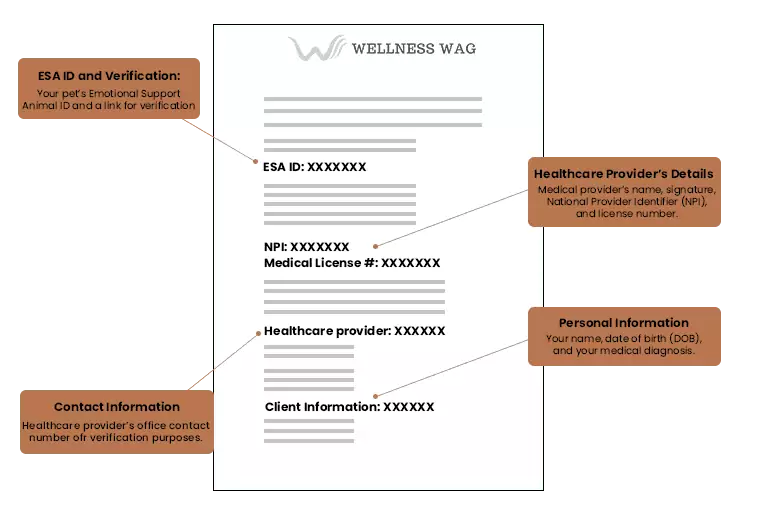Experience Our Quick and Easy Process
Experience Our Quick and Easy Process


Discover Your ESA Eligibility
Start Your Emotional Support Animal (ESA) registration by answering brief questions about your ESA requirements.

Consult with an experienced doctor
Consult a licensed medical professional for expert guidance and care.

Obtain your official esa letter
Get approved and receive your emotional support animal letter Housing within 24 hours.
Benefits of Emotional Support Animal Letter For Housing
Having an ESA letter can significantly improve your living situation, especially if you face restrictions on keeping pets in your home. Here are the detailed benefits of having an ESA letter for housing:
No-Pet Policies
Many landlords and property managers have strict no-pet policies, which can make it challenging to find a suitable place to live if you have a pet that provides emotional support. With an ESA letter, you are legally allowed to keep your emotional support animal in your home, even if the building has a no-pet policy. This means you won’t have to worry about finding pet-friendly housing or facing eviction due to your pet.
No Extra Fees
Typically, landlords may charge pet fees or deposits for tenants with pets. These fees can add up quickly and become a financial burden. However, with a valid ESA letter, you are exempt from paying these additional charges. Landlords are required by law to waive pet fees and deposits for emotional support animals. This makes having an ESA more affordable and less stressful.
Protection Under the Law
Your ESA letter provides legal protection under the Fair Housing Act (FHA). This federal law requires landlords to make reasonable accommodations for tenants with emotional support animals. It means they cannot deny you housing or impose additional restrictions because of your ESA. If a landlord refuses to accept your ESA letter, they could face legal consequences.
Access to More Housing Options
Without an ESA letter, your housing options may be limited to pet-friendly properties, which are often more expensive and less available. With a housing ESA letter, you can widen your search and consider a broader range of housing options, ensuring you find the best possible home for you and your emotional support animal.
Improved Mental Health
Having your emotional support animal with you at home can significantly enhance your mental health and well-being. Pets provide companionship, reduce anxiety, and offer emotional stability. With an ESA letter, you can ensure that your pet can stay with you, providing the comfort and support you need in your daily life.
How to Get an ESA Letter for Housing?
Getting an emotional support animal (ESA) letter for housing is a straightforward process, but it does require meeting certain criteria set by a licensed mental health professional. Here’s a detailed look at how you can qualify for an ESA letter for housing:
Understand What an ESA Letter Is
An ESA letter is an official document written by a licensed mental health professional. It states that your pet is a crucial part of your treatment for a mental or emotional disability. This letter allows your pet to live with you, even in housing with no-pet policies, and protects you from extra fees or deposits.
Identify Your Need for an ESA
To qualify for an ESA letter, you must have a mental or emotional condition that benefits from having a pet. Common conditions that can qualify you for an ESA letter include:
- Anxiety
- Depression
- Post-Traumatic Stress Disorder (PTSD)
- Panic Attacks
- Chronic Stress
- Phobias
Your pet provides emotional support that helps alleviate symptoms of these conditions, making them an essential part of your treatment plan.
Consult with a Licensed Mental Health Professional
The next step is to consult with a licensed mental health professional, such as a therapist, psychologist, or psychiatrist. This can often be done online, making the process convenient and accessible. During the consultation, you will discuss your mental health condition and how your pet helps you manage your symptoms.
You may be asked to complete a simple assessment form. This form will gather information about your mental health, your relationship with your pet, and how your pet helps you. The assessment is designed to help the mental health professional understand your situation and determine if an ESA letter is appropriate for you.
Receive Your ESA Letter
If the mental health professional determines that you qualify, they will issue an ESA letter. This letter will include:
- The professional’s license number, type, and date
- Your name and the details of your emotional support animal
- A statement that you have a mental or emotional disability recognized in the Diagnostic and Statistical Manual of Mental Disorders (DSM-5)
- A statement that your ESA is necessary for your mental health or treatment
Present Your ESA Letter to Your Landlord
Once you have your ESA letter, you can present it to your landlord or property manager. Under the Fair Housing Act, they are required to make reasonable accommodations for your emotional support animal without charging additional fees or deposits. This means your pet can live with you, even in housing that typically does not allow pets.
Emotional Support Animals Housing Laws
Understanding the laws that protect your right to live with an emotional support animal (ESA) is essential. These laws ensure that individuals with mental health conditions can keep their emotional support animals without facing discrimination or excessive fees. Here’s what you need to know about ESA housing laws:
Fair Housing Act (FHA)
The primary law that protects your rights as an ESA owner is the Fair Housing Act (FHA). This federal law prohibits discrimination in housing based on disability, which includes mental health conditions. Under the FHA:
- Reasonable Accommodation: Landlords must make reasonable accommodations for individuals with disabilities, which includes allowing emotional support animals even in no-pet housing. This means you can keep your ESA with you without facing eviction or additional fees.
- No Pet Fees or Deposits: Landlords cannot charge extra pet fees or require pet deposits for emotional support animals. This can save you a significant amount of money compared to standard pet policies.
- Documentation: Landlords are allowed to request documentation to verify the need for an ESA. This is where your emotional support animal letter comes in. It must be issued by a licensed mental health professional and state that you have a disability and that your animal provides emotional support that alleviates one or more symptoms of your condition.
Americans with Disabilities Act (ADA)
While the Americans with Disabilities Act (ADA) primarily covers service animals, it’s important to note that emotional support animals are not considered service animals under the ADA. This means that the ADA does not grant ESAs the same public access rights as service animals. However, the FHA still protects your right to have an ESA in housing.
State and Local Laws
In addition to federal laws, some states and municipalities have their own laws regarding emotional support animals. These laws can provide additional protections or clarify the rights of ESA owners. It’s a good idea to familiarize yourself with any specific regulations in your state or local area to ensure you understand all your rights and responsibilities.
Your ESA Letter Contains the Following:
Money back Guarantee

If Your Housing ESA Letter is not approved, we will refund 100% of your payment.

See what our happy Pet parents have to say…
Meet Some of Our Compassionate Care Team
ESA Letter Walkthrough: Your Visual Guide to Comfort and Connection
Who Can Benefit from an ESA?


What is an emotional support animal?
An emotional support animal (ESA) is an animal that provides therapeutic benefits to individuals with mental or emotional disabilities. ESAs offer companionship, comfort, and support, helping to alleviate symptoms associated with conditions like anxiety, depression, and post-traumatic stress disorder. Individuals with ESAs are protected by laws that allow them to live in housing with no-pet policies. It’s important to note that there is no official emotional support animal registration, but an ESA letter from a licensed mental health professional is usually required.
Are emotional support animals considered service dogs?
No, emotional support animals (ESAs) are not considered service dogs. While both serve vital roles in providing support to individuals, service dogs are specifically trained to perform tasks or work directly related to a person’s disability. ESAs, including emotional support animals, provide therapeutic companionship and emotional support but are not trained to perform specific tasks.
What is the difference between an emotional support animal and a service animal?
The main difference between an emotional support animal (ESA) and a service animal lies in their legal recognition and access rights. Service animals, such as service dogs, are protected by the Americans with Disabilities Act (ADA) and have public access rights, allowing them to accompany their handlers in places open to the public. ESAs, however, are not granted the same access rights under the ADA and are typically not allowed in public places that do not permit pets. Even though there is no specific emotional support animal registration, an ESA letter from a licensed mental health professional can provide certain protections in housing. It’s essential to understand the specific laws and regulations regarding the rights and accommodations for service animals and ESAs.

Discover Wellness Wag
We at Wellness Wag, comprise a team of devoted professionals who believe in enhancing lives through the healing power of emotional support animals. With our extensive experience in the sector, we’ve aided countless individuals in finding tranquility, comfort, and a revitalised sense of well-being through the companionship of an Emotional Support Animal.
Our objective at Wellness Wag is to ensure reliable and accessible Emotional Support Animal Letters consultations. This provides individuals battling emotional and mental health issues the chance to witness the life-changing impact of an ESA’s companionship. We are committed to equipping our clients with the knowledge and resources to navigate this process with confidence and empathy.
Discover The Effortless Way To Get Your Legitimate ESA Letter With Wellness Wag

Complete Our Assessment
Take our quick assessment to tell us about your situation and emotional support needs, so we can tailor our services to your housing letter for ESA.

Consult With Medical Physicians
After you submit the required forms, we’ll link you with a licensed medical professional for a personalized consultation and thorough evaluation to assess your eligibility for an ESA.

Receive Your ESA Letter
Upon confirmation by our team, you’ll receive a professionally crafted ESA letter with legal recognition within 24 hours of your consultation.
Wellness Wag offers a Money Back Guarantee to ensure a stress-free experience with your pet.
If, for any reason, your legitimate ESA letter doesn’t work, we will refund your money in full.
Whether it’s because of non-qualification or illegal denial by your landlord, we’ve got you covered.
Our policy guarantees a 100% refund for two reasons:
Embrace the transformative benefits of emotional support animals with ease.
Choose Wellness Wag for a smooth process guided by our trusted team of medical physicians.
Enjoy the positive impact of the ESA experience for you and your furry companions.























